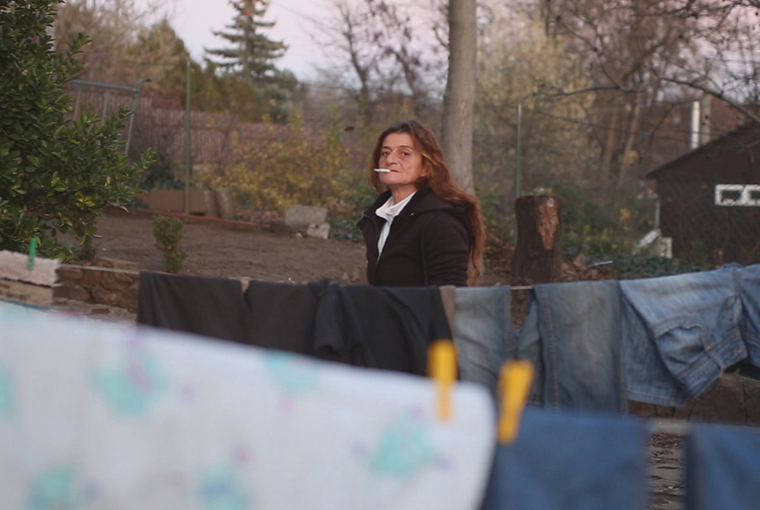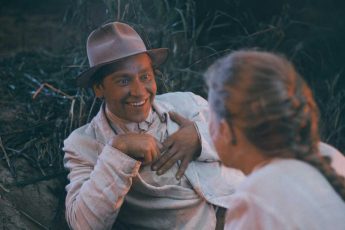The Unhappy Fate of a Woman
Bernadett Tuza-Ritter’s A Woman Captured (2017)
Vol. 82 (February 2018) by Colette de Castro
A Woman Captured portrays at once the immense fragility of a woman who has been enslaved for ten years by a Hungarian family, and her startling strength. Beyond the double meaning of the film’s title – it being about an enslaved woman whose life is filmed (captured) over the course of a year and a half – one could also eke out a third. The filmmaker herself, Bernadett Tuza-Ritter, is captured. She is fascinated by her 52-year-old protagonist (Marish), who has managed to survive in this situation where she is working endless hours for her devious detainer whose cruel ways have made it next to impossible for Marish to escape. Tuza-Ritter captures and is captivated by the banality of a strange situation.
The idea for the film came about when the filmmaker met a woman (Eta) who claimed to be proud of keeping unpaid workers. Bernadett Tuza-Ritter filmed Marish (the name her captors called her after confiscating her identity card) for at least a year before the latter managed to work up the courage to escape – given strength by the filmmaker’s continued presence and support. Thus the filmmaker made her active position clear from the beginning by encouraging Marish to leave: unable to be a passive bystander to the unhappy fate of a woman who quickly became her protegée and friend.
Marish is forced to work for a woman and her sons, serving them and cleaning their house; eating and sleeping very little. She also works at a nearby factory for eight hours a day – prevented even from keeping her own salary. If she asks for any money she is beaten. The situation which led her into such debt is unclear and there are only vague murmurings about the impossibility of leaving. She is not allowed to see her children, especially her sixteen-year-old daughter who had run away one year prior to the film’s debut. All these facts are not clear from the outset – Ritter gradually spoon-feeds us this information until we feel quite sick. All this awfulness seems to be orchestrated by that same woman – Eta. The face of Eta is never seen, but we catch glimpses of her long, red, plastic fingernails and wrinkled hands, often pointing accusingly at Marish. We hear her scathing voice mocking Marish, tormenting her into speaking back or standing up for herself. The background audio of some of the scenes in which an exhausted, bent-over Marish cleans the floor features Eta’s voice arguing over the phone, but also speaking kindly to her little dog.
Eta reminds me of the cruel grandmother (nicknamed “the witch”) in the first of Agota Kristov’s epic wartime novels, The Notebook. The way the grandmother hits her grandchildren, forces them to work until exhaustion, finds fault with everything they do and criticizes them endlessly is reflected in Eta’s taunting ways. She, too, treats Marish like an ungrateful child who deserves no human kindness. Sometimes Eta’s tactics are decidedly more modern and addressed to a grown woman: she threatens her children, and in one particularly disturbing scene, coaxes Marish into signing her name to papers involving shady loans, and threatens her with death.
Marish certainly seems to act like a frightened child around Eta – her oral addiction to cigarettes a thumb to suck, her uncomfortable sleeping-place a small child-sized sofa. She also reveals an obsession with hiding away small objects, which she is afraid will be found and destroyed or mocked. Her very body – which seems to have aged at least twenty years in the decade she’s been there – is diminished by her treatment both by Eta and by Eta’s sons who make fun of her by sarcastically mocking her every action as she waits on them hand and foot.
Marish’s attitude towards the filmmaker is also that of a child. When they are walking along the road she admits that sometimes she picks flowers. She asks hesitantly: “is that bad”? When the voice behind the camera gives her consent she gleefully goes to pick a large bunch of bright-yellow flowers outside someone’s house. When she spies the owner near the house she expresses hope that she won’t get into trouble. Her relationship to the filmmaker expands and changes throughout the film. It is clearly one of parent and child but it is not clear who should have which role. The numerous over-the-shoulder shots, as well as creating empathy with the character, often give us the feeling that Ritter (acting as camerawoman) is literally protecting Marish, walking behind her as a mother might watch over her child. Marish is more childlike at the beginning of the film, beaten into submission through a combination of humiliation and exhaustion, but later on she takes on the role of mother, asking about the filmmaker’s own well-being and looking down at her camera in low-angle shots. Ritter asks Marish many questions, and although she avoids direct intervention she soon asks “Why don’t you leave”, and even becomes so honest as to ask, “Does it bother you that I’m paying Eta to film you”?
The relationship between filmmaker and subject is intensely personal, and Ritter’s emotional desire to bring out the character of Marish shines through throughout the film. It might be thought to be the choice of the editor rather than the director’s, but the first editing credit is for Ritter herself (the other is for Nóra Richter). Marish stares right over the camera – over our heads if you wish – and into the eyes of the filmmaker, for whom she has only one question that matters: “Can I trust you?”.
It serves the purpose of the film to portray one woman, but it does not allow much room for universality, glimpses of which are revealed near the beginning of the film when a title states “until I met Marish, I was not aware that modern slavery existed”. Interestingly, the filmmaker’s voice is not heard at the beginning. She only speaks through text on the screen, but as the film goes on she allows her conversation with Marish to be heard more and more. We also see that Eta has more slaves, including a young man who seems to be able to stand up for himself a lot better than Marish.
The documentary is a glimpse into a hidden world revealed by the happenstance of a slave-owner’s pride and naivety. All she seems to care about is money. The filmmaker tried to call the police about Marish’s situation but they were unable and seemingly unwilling to help.
From this harrowing story there emerges a quite tender portrayal of a woman who has lost a good chunk of her life to an out-of-control situation. Hers is a journey from near death to touching life, and one of a woman who is no longer captured in any way.



